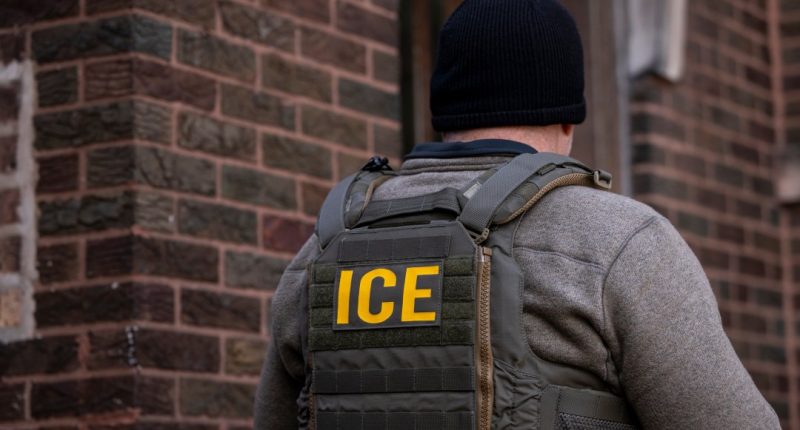Share this @internewscast.com
() Sheriff’s departments throughout Texas could be forced to cooperate with Immigration and Customs Enforcement if Gov. Greg Abbott signs a bill into law that was recently approved by the state legislature.
The bill mandates that departments in 238 of the state’s 254 counties enter into at least one form of a 287(g) agreement or a similar federal program, which gives deputies the authority to carry out immigration enforcement duties once they are trained.
Seventy-three Texas counties have existing agreements with ICE. However, the proposed law would require full participation, and the Texas Attorney General could sue non-compliant departments.
Trump recently wrote on Truth Social that he is monitoring the bill, adding, “It is important to Texas, and to our country.”
Lawmakers who helped propel the bill to Abbott’s desk claim it makes communities safer. Texas Rep. David Spiller, a Republican, told that he believes if passed, the bill also offers a national blueprint on how to build cooperation between local and federal immigration agencies.
“We’re identifying bad actors and people who have warrants for removal,” Spiller said. And if they committed acts that justify removal from the United States, those folks, they certainly don’t need to be here.”
However, some sheriffs are concerned about what they call unfunded mandates to participate in federal operations. Democrats also fear it could lead to racial profiling.
What is required under the bill?
Three 287(g) models exist, and under the proposed law, departments have the choice of how many options they employ.
- Jail Enforcement Model – This allows officers to interrogate incarcerated individuals to determine their immigration status, input their information into a Homeland Security database, take statements, and initiate the deportation process through an immigration detainer and notice to appear.
- Warrant Service Officer Model – Officers identify people as non-citizens during the booking process, referring those people to ICE for evaluation and possible deportation. Officers also serve ICE administrative warrants on people in custody.
- Task Force Model – This method allows local officers to enforce immigration laws during their routine duties in the community.

Of the Texas 73 counties with agreements, 18 have officers trained in the task force model, while 70 participate use one of the jail-related agreements, The Texas Observer reported. Others have applications to become part of the 287 (g) program in place.
The proposed bill provides grants to offset costs, ranging from $80,000 per year to $140,000, with the largest amounts reserved for counties with more than 1 million residents.
Spiller said lawmakers are encouraging departments to follow the Warrant Service Officer model, which allows ICE to pick up an inmate within 48 hours once they are identified in the ICE database. He added that the bill is about identifying bad actors who have previously been ordered to leave the country, and not about deputies being required to enforce federal immigration law.
But he said full participation is needed.
“(Some larger counties) know that some of these folks that they’ve arrested may have outstanding federal warrants, and they knowingly and willingly turn a blind eye and choose not to look,” Spiller said. “We can’t have these people turned back onto the street because they’re a public safety concern.”
Texas sheriffs get ‘to play Border Patrol’
Abbott has already “made it clear” Texas cities and counties must fully cooperate with the federal government’s efforts to arrest, jail, and deport illegal immigrants, the governor’s spokesman told .
He did not specify when Abbott could sign the bill into law.
Some sheriffs with existing 287 (g) agreements praise the mandatory participation, which allows flexibility without forcing deputies to “go out and play Border Patrol or ICE”, Terrell County Sheriff Thaddeus Cleveland said. The Republican sheriff understands why some in his position may choose not to go that far, but calls having the ability to get inmates into federal custody faster a “no-brainer.”
“You’re being given the tools (under the bill) to make this country safer,” said Cleveland, who uses the two jail-related programs and has applied for the task force model training. “I don’t see what people wouldn’t want to participate.”
Some sheriffs worried about costs to their departments
Just east of Houston, Chambers County Sheriff Brian Hawthorne announced this spring that not all Sheriff’s Association of Texas members support the bill’s required participation, Houston Public Media reported.
Hawthorne, a Republican who has had a 287 (g) agreement in place for the past four years, said many departments were concerned about unfunded mandates, despite the availability of grant money. Some fear that the largest grants may not cover the costs of what departments are being asked to do.
Harris County Sheriff Ed Gonzalez announced in 2017 that the department maintains law and order in the state’s largest county, which includes the city of Houston. The county ended its 287(g) agreement, and Gonzalez announced he was allocating the $675,000 he spent on the deal toward improving case clearance rates and other department priorities.

While not every department will face that large of a financial burden to carry out respective 287 (g) agreements, Hawthorne, the legislative chairman of the state sheriffs’ association, told that forcing every department has raised concerns among some Democratic sheriffs who are worried about the political overtones of the issue that may be alarming and bothersome to some residents in more left-leaning counties.
Sheriffs have expressed their displeasure about the statewide mandate to Hawthorne, but all those already allow ICE into their jail facilities, as incarcerated inmates are transferred into federal custody. Ultimately, Hawthorne believes the flexibility built into the bill makes it more palatable for local departments, which are all tasked with protecting their communities.
“Remember, the sheriff works for the people, and I’ve never seen a sheriff who didn’t believe in the rule of law,” Hawthorne said. “But as you and I both know, sometimes, the rule of law has a whole lot of differing opinions and ideas.”
Democrats fear proposed law will lead to racial profiling
State Sen. Roland Gutierrez, a Democrat representing San Antonio, raised other potential red flags.
“Are you not afraid of the potentiality for racial profiling by police if they see what presumably looks like Mexican or Hispanic people in a truck, that they will not be pulled over simply because of the color of their skin?” Gutierrez asked the bill’s senate sponsor, Republican Charles Schwertner, during the senate debate, according to the Texas Tribune.
Sarah Cruz, the policy and advocacy strategist for border and immigrant rights with the Texas ACLU, voiced similar concerns after the bill passed the Texas legislature.
“(The bill) will not make communities safer, but it will force sheriffs to do the work of ICE in support of the federal government’s shameless mass deportation efforts,” Cruz said.
Spiller, like Schwertner, maintains that the bill has nothing to do with race or nationality, but instead is more about helping ICE take those already in their base into custody and out of the jurisdiction of local sheriff’s offices.
Federal vs state jurisdiction lines blurred
Kristin Etter, the director of policy and legal services for the Texas Immigration Law Council, calls the measure a “real slap in the face” to local law enforcement agencies tasked with protecting their communities.
Etter told that if Abbott signs the bill and it withstands legal challenges that similarly arose involving a 2017 law that abolished sanctuary cities in Texas, departments may find themselves in a precarious position. She also fears Texas could become the federal inspiration for forcing states to help drive Trump’s immigration mission.
“(The bill) is really placing Texas law enforcement agents under the service of the federal government,” Etter said. “So, there’s really no longer going to be any local control of how they protect their communities and keep their communities safe.”
Spiller, however, disagrees and says the bill, while required, offers departments flexibility while also ensuring everyone is on the same page to better protect local counties and Texas as a whole.
“We’re trying to make communities safer and the streets safer,” Spiller said, “and this is the best way we have to do it.”










